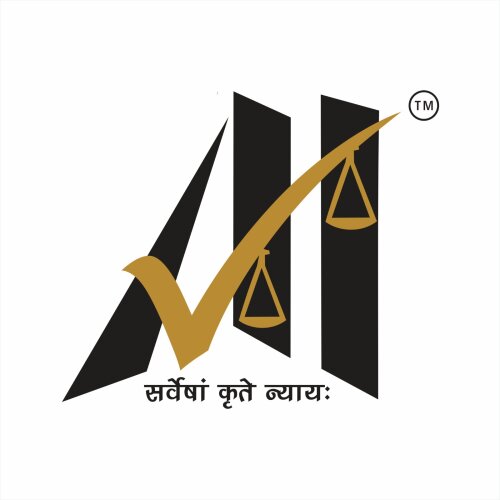Best Antitrust Lawyers in Jaipur
Share your needs with us, get contacted by law firms.
Free. Takes 2 min.
List of the best lawyers in Jaipur, India
About Antitrust Law in Jaipur, India
Antitrust law in Jaipur, India, part of the broader framework of competition law, is designed to promote market competition by regulating anti-competitive conduct by companies. These laws are crucial for ensuring consumer welfare, protecting small and medium enterprises, and preventing monopolistic practices. Jaipur, as the capital city of Rajasthan, adheres to the Competition Act, 2002, the primary statute governing antitrust matters across India. The Competition Commission of India (CCI) plays a significant role in enforcing these laws and maintaining fair market conditions.
Why You May Need a Lawyer
There are multiple situations where you may require legal assistance in antitrust matters:
- Merger and Acquisitions: Legal oversight to ensure that mergers and acquisitions do not lead to a dominant position that could negatively impact market competition.
- Cartel Investigations: If you are implicated in alleged cartel activities, a lawyer can help navigate the complexities of CCI investigations and represent your interests.
- Anti-Competitive Agreements: Assistance in drafting or reviewing contracts to ensure they comply with antitrust laws, preventing unfair practices like price-fixing or market allocation.
- Abuse of Dominance: Legal guidance if your company is accused of abusing its dominant market position or if you are affected by another company's monopolistic practices.
- Litigation: Representation in court for disputes arising from anti-competitive practices or defending against antitrust litigation.
Local Laws Overview
The key aspects of local laws relevant to antitrust in Jaipur, India include:
- The Competition Act, 2002: The primary legislation overseeing antitrust matters. It prohibits anti-competitive agreements, abuse of dominant position, and regulates mergers and acquisitions to ensure they do not adversely affect competition.
- Role of the Competition Commission of India (CCI): The CCI is the regulatory body responsible for enforcing competition laws, investigating potential breaches, and imposing penalties for violations.
- Section 3 of the Competition Act: Deals with anti-competitive agreements that can significantly prevent, restrict, or distort competition in markets.
- Section 4 of the Competition Act: Prohibits abuse of dominant position by enterprises or groups.
- Merger Control Regulations: These regulations require certain mergers and acquisitions to be approved by the CCI to ensure they do not harm market competition.
Frequently Asked Questions
What is the role of the Competition Commission of India (CCI)?
The CCI is the regulatory authority that enforces competition laws in India. It investigates anti-competitive practices, approves significant mergers and acquisitions, and imposes penalties for violations.
What types of agreements are considered anti-competitive?
Agreements that can be considered anti-competitive include price-fixing, market allocation, bid-rigging, and exclusive supply or distribution agreements that significantly limit competition.
What constitutes abuse of dominant position?
Abuse of dominant position can include practices such as predatory pricing, limiting production, imposing unfair conditions on transactions, or denying market access to competitors.
When is a merger or acquisition scrutinized by the CCI?
Mergers and acquisitions that exceed certain asset or turnover thresholds prescribed under the Competition Act, 2002 need approval from the CCI to ensure they do not negatively impact market competition.
How can I file a complaint with the CCI?
You can file a complaint with the CCI by submitting information in the prescribed format, either in writing or online, detailing the anti-competitive practices observed.
What are the penalties for violating antitrust laws?
Penalties for violating antitrust laws in India can include fines, orders to cease and desist from anti-competitive practices, and in some cases, annulment of certain agreements or business practices.
Can a company defend itself against claims of anti-competitive practices?
Yes, a company can defend itself by presenting evidence and arguments to the CCI or competent courts demonstrating that their practices are not anti-competitive or are necessary for business efficiency.
Are there any exemptions to antitrust laws?
Certain agreements, particularly those promoting technical efficiency, or agreements necessary for protecting small businesses, may be exempt from antitrust laws if they are in the public interest and don’t substantially harm competition.
Can antitrust laws affect global companies operating in Jaipur?
Yes, global companies operating in Jaipur must comply with Indian antitrust laws, particularly if their practices have a significant impact on the Indian market.
Why is compliance with antitrust laws important?
Compliance with antitrust laws is crucial to avoid hefty fines, operational restrictions, and potential damage to reputation. It also fosters a fair competitive environment benefiting consumers and businesses alike.
Additional Resources
- Competition Commission of India (CCI): The primary regulatory body for enforcing antitrust laws.
- Ministry of Corporate Affairs: Provides information and resources related to the business regulatory environment in India.
- Legal Aid Services: Non-profit organizations and government bodies offering free or subsidized legal assistance. Check local Jaipur listings.
- Business Chambers: Organizations such as the Federation of Rajasthan Trade & Industry (FORTI) that offer resources and guidance on compliance with commercial laws.
Next Steps
If you need legal assistance in antitrust matters, consider the following steps:
- Identify Your Need: Determine the specific antitrust issue you are facing, whether it's related to mergers, anti-competitive practices, or compliance.
- Consult a Lawyer: Contact a lawyer specializing in antitrust law for an initial consultation. They can provide you with tailored advice and represent you in legal proceedings.
- Gather Documentation: Prepare all relevant documents and evidence related to your case. This can include contracts, emails, market analysis, and any communication with competitors.
- File a Complaint if Necessary: If you believe there is a violation of antitrust laws, your lawyer can help you file a complaint with the CCI.
- Stay Informed: Keep yourself updated on any changes in local and national antitrust laws to ensure ongoing compliance.
By taking these steps, you can effectively address your antitrust concerns and ensure your business operations remain within the legal framework.
Lawzana helps you find the best lawyers and law firms in Jaipur through a curated and pre-screened list of qualified legal professionals. Our platform offers rankings and detailed profiles of attorneys and law firms, allowing you to compare based on practice areas, including Antitrust, experience, and client feedback.
Each profile includes a description of the firm's areas of practice, client reviews, team members and partners, year of establishment, spoken languages, office locations, contact information, social media presence, and any published articles or resources. Most firms on our platform speak English and are experienced in both local and international legal matters.
Get a quote from top-rated law firms in Jaipur, India — quickly, securely, and without unnecessary hassle.
Disclaimer:
The information provided on this page is for general informational purposes only and does not constitute legal advice. While we strive to ensure the accuracy and relevance of the content, legal information may change over time, and interpretations of the law can vary. You should always consult with a qualified legal professional for advice specific to your situation.
We disclaim all liability for actions taken or not taken based on the content of this page. If you believe any information is incorrect or outdated, please contact us, and we will review and update it where appropriate.














